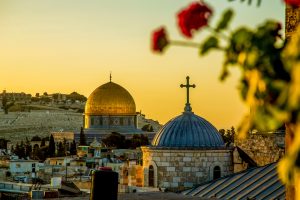
Syeda Nooresahar Ahmad, UK
The 15th of August marks the Catholic celebration of the ‘Assumption of Mary,’ according to their belief that rather than dying a mortal death, Mary (as) was assumed into heaven at the end of her life. Countries around the world mark the occasion in ways unique to their cultures and customs; for example, following one belief that rather than finding a body, flowers were discovered at the grave of Mary (as), those celebrating in Poland dress using flowers and herbs as decoration[i]. In Italy, colourful processions are seen in the streets. In Greece, numerous festivals and events are hosted throughout the country. In Spain, celebrations last from the 11th to the 15th of August, ending with a grand celebration in the streets of Madrid. In Croatia, more than 50,000 Catholics gather each year to celebrate the occasion at a large Marian shrine.[ii]
However, as with many events that were previously considered the norm, the Coronavirus pandemic casts a shadow, rendering long-upheld customs as impossible. Street parties, festivals, processions; all are restricted in many countries. For example, in Italy, Catholic Churches are able to hold masses, but only with strict social distancing and mandatory mask-wearing.[iii] Perhaps, then, the celebrations this year will be more reflective than festive. And perhaps, then, it provides a good opportunity to contemplate the significance of Mary (as) and the teachings surrounding her death- not only in Christianity, but also in Islam.
What is the ‘Assumption’ and where does it come from?
The Assumption, also known as the Dormition of Mary (meaning eternal sleep), is not actually originally based on scripture. In fact, it is not a particularly long-established belief; it was introduced into Catholic dogma in 1950 by Pope Pius XII, who defined that Mary (as), ‘having completed the course of her earthly life, was assumed body and soul into heavenly glory’. Rather than the Bible, Pope Pius XII used the universal consensus of the Church as a suitable foundation for the belief.[iv]
Therefore, the premise of the Assumption relies heavily on other Christian convictions- such as the belief that Jesus (as) is the son of God. For Catholics, the idea that the mother of Jesus (as) (or, in Christian belief, the mother of God) would have to suffer a mortal death is not befitting, whereas it is deemed more suitable that at the end of her life she should have simply fallen asleep and awoken in heaven.
It is worth noting that the Assumption is not totally unique to Catholic doctrine. For example, in the Eastern Orthodox Church, whilst the dogma of the Pope is rejected, the Dormition of Mary has been commemorated since the 6th century,[v] supposedly dating back to apostolic traditions.[vi]
The occasion gives Christians the opportunity to celebrate the life of Mary (as)- indeed, some regard the day of the Assumption as her birthday. In Greece, for example, Mary (as) is viewed as a sacred figure, intrinsically linked with the freedom of the nation and a symbol of protection and comfort.[vii] More generally, in the Catholic Church, ‘Veneration of Mary’ is the term given to describe the various modes of Marian worship, and there are numerous Marian shrines established by the Roman Catholic Church around the world.
The Status of Mary (as) in Islam
In Islam, there is no such emphasis on the circumstances surrounding the passing of Mary (as). In fact, as Jesus (as) is regarded as a devoted prophet of Allah rather than the son of God, both he and his mother are viewed as having existed in the same temporal state that the rest of mankind occupies. Moreover, any kind of prayer or worship directed towards Mary (as) would contradict the values of Islam, as the Holy Qur’an states:
‘And those on whom they call beside Allah create not anything, but they are themselves created. They are dead, not living; and they know not when they will be raised.’ [viii]
Nevertheless, the status of Mary (as) in Islam is extraordinary. Perhaps one of the greatest testaments to this is the fact that an entire chapter of the Holy Qur’an is named Surah Maryam (chapter of Mary).
Islamic beliefs regarding Hazrat Maryam (as) find their source in the Holy Qur’an, which some 1400 years ago provided illuminating details on the events surrounding her birth and early life. The story of Mary (as) begins with another woman’s ardent prayers and devotion to God. It is related how her mother, Hanna, devoted her unborn child to the cause of Allah. Yet, when that child was born a girl, Hanna was consternated and confused, under the impression that a girl would not be able to fulfill the noble purpose her mother had dedicated her to:
‘But when she was delivered of it, she said, ‘‘My Lord, I am delivered of a female’ — and Allah knew best what she had brought forth and the male she was thinking of was not like the female she had brought forth — ‘and I have named her Mary, and I commit her and her offspring to Thy protection from Satan, the rejected.’’ [ix]
Thus, from one righteous woman another righteous woman was born; one who was chosen by Allah to change the course of history forever.
Mary (as) was extremely pious during her childhood, spending her time alone in devotion to Allah. The next part of her life is etched into the collective history of mankind; the young virgin Mary (as) was informed by an angel that she was to have a child. Confused and afraid, she submitted to the will of her Lord, she went through agonising pains of childbirth, and she suffered the taunts and mockery of other people. The legacy of Mary’s (as) obedience, bravery and sacrifice is immortalised in the Holy Qur’an:
‘And remember when the angels said: O Mary, Allah has chosen thee and purified thee and chosen thee above the women of all peoples.’ [x]
She is further described as the role model of a true believer:
‘And the example of Mary, the daughter of ‘Imran, who guarded her private parts — so We breathed into him of Our Spirit — and she fulfilled in her person the words of her Lord and His Books and was one of the obedient.’ [xi]
Also in the Holy Qur’an, Jesus (as) is frequently referred to as ‘Isa Ibn-e-Maryam’, meaning ‘Jesus, son of Mary’; a reminder that the already eminent status of the Prophet is only strengthened by his associations to his righteous mother. The Qur’an does not go into detail about the death of Mary (as), but the idea of an assumption directly contradicts its teachings:
‘Allah takes away the souls of human beings at the time of their death… He retains those against which He has decreed death… In that surely are Signs for a people who reflect.’ [xii]
In Islamic terms, it is impossible that there was anything irregular or exceptional in this holy woman’s passing. Of the later part of her life, the Holy Qur’an simply states:
‘And We made the son of Mary and his mother a Sign, and gave them refuge on an elevated land of green valleys and springs of running water.’ [xiii]
The following verse also proves that both Jesus (as) and Mary (as) were human beings and that all human beings are mortal: ‘They both used to eat food.’[xiv]
Furthermore, according to evidence presented by the Promised Messiah and founder of the Ahmadiyya Muslim Community, Hazrat Mirza Ghulam Ahmad (as) that Jesus (as) spent the end of his life in India, there is evidence that there is also a grave belonging to Mary (as) there, suggesting she followed her son to India:
‘There is evidence of a number of roads taken by Jesus (as) during his journey to Kashmir as named after him… of the town of Murree near Kashmir… a supposed Grave of Our Lady lies. The Grave, named as Mai Mari da Asthan that translates to ‘the Final Resting Place of Mother Mary’, showcases an east to west oriented tomb which is… identical to the Tomb of Jesus (as) in Srinagar. The Grave of Mother Mary is highly revered by the local inhabitants of Kashmir who often call this site as the Tomb of the Mother of Issah or Jesus (as) in the Islamic term.’ [xv]
Wherever her final resting place may have been, the status of Hazrat Maryam (as) in Islam remains as it was: born to a righteous woman, mother of a prophet, exalted above all women, and an example to every believer.[xvi]
About the Author: Syeda Nooresahar Ahmad, having just completed her A levels, will commence studying English Language and Literature at University. She regularly writes for the blog site of the Ahmadiyya Ladies Association UK ‘Voice of British Muslim Women’, and is the local Publications Secretary for the Hartlepool chapter of the Ahmadiyya Muslim Community UK
[i]https://www.urbanadventures.com/blog/celebrate-assumption-of-mary-europe/
[ii]https://www.planeteu.com/holidays/assumption-of-mary/
[iii]https://www.bbc.co.uk/news/explainers-52575313
[iv]https://www.vatican.va/content/pius-xii/en/apost_constitutions/documents/hf_p-xii_apc_19501101_munificentissimus-deus.html
[v]https://www.catholiceducation.org/en/culture/catholic-contributions/the-dormition-of-mary.html
[vi]https://orthodoxwiki.org/Dormition
[vii]https://greece.greekreporter.com/2019/08/14/the-feast-of-the-dormition-of-the-virgin-mary-celebrated-throughout-greece/
[viii]The Holy Qur’an, 16:21-22
[ix]The Holy Qur’an, 3:37
[x]The Holy Qur’an, 3:43
[xi]The Holy Qur’an, 66:13
[xii]The Holy Qur’an, 39:43
[xiii]The Holy Qur’an, 23:51
[xiv]The Holy Qur’an, 5:76
[xv]https://rorenglish.wpengine.com/14342/maryas-mother-of-jesusas/
[xvi]The Holy Qur’an, 66:13




Add Comment